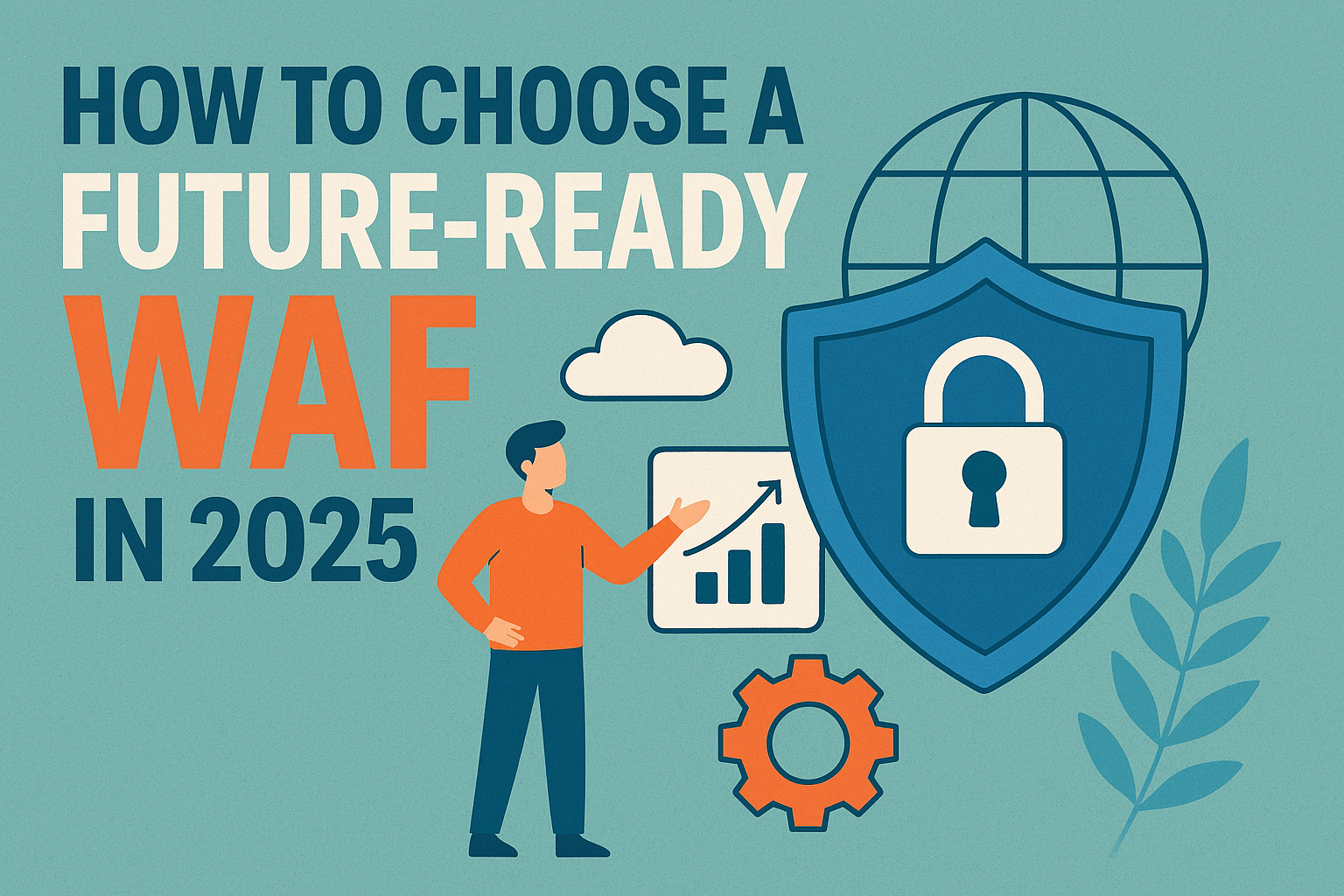How to Choose a Future-Ready WAF in 2025

Modern web applications face cyber threats that are faster, smarter, and more unpredictable than ever. In 2025, attackers aren’t just targeting websites, they're exploiting APIs, cloud platforms, AI-driven tools, and microservices. As a result, businesses need more than a traditional firewall. They need a future-ready Web Application Firewall (WAF) that can adapt, learn, and defend against advanced attacks.
Why You Need a Future-Ready WAF in 2025
Cyber threats are evolving every month. From AI-powered hacking bots to zero-day exploits and automated credential stuffing, your traditional firewall can’t keep up.
A future-ready WAF helps you:
-
Block advanced threats before they reach your server
-
Protect APIs, apps, logins, and customer data
-
Maintain uptime during peak traffic or DDoS attacks
-
Comply with global security regulations
-
Gain visibility into real-time attacks
In short, it turns threats into trust by showing customers that their data is safe.
Key Features to Look for in a 2025 WAF
Not all WAFs are equal. The best ones today use automation, AI, and cloud intelligence to stay ahead of attackers.
AI & Machine Learning Threat Detection
A modern WAF must detect:
-
Unknown attack patterns
-
Behavioral anomalies
-
Zero-day exploits
-
Bots that mimic real users
AI-driven WAFs can predict and block threats instead of waiting for signatures.
Full API Protection
Web apps now rely heavily on APIs, making them a prime attack vector.
Look for WAFs that protect:
-
REST APIs
-
GraphQL APIs
-
Microservices
-
Serverless functions
API security is no longer optional it’s essential.
Advanced Bot Management
In 2025, bots handle everything from scraping to credential-stuffing.
A good WAF should detect:
-
Bad bots
-
Fake browsers
-
Automated brute force
-
Botnets targeting logins
The best WAFs include bot fingerprinting, CAPTCHA bypass detection, and device scoring.
Layer-7 DDoS Protection
Attackers love overwhelming apps with huge traffic spikes.
Choose a WAF that offers:
-
Application-level DDoS defense
-
Auto-scaling during attacks
-
Real-time rate limiting
This keeps your website fast even during an attack.
Automatic Rule Updates
A 2025-ready WAF should update itself automatically with the latest threat intelligence.
No manual rule writing. No outdated signatures.
Just continuous protection.
Multi-Cloud & CDN Integration
If your application runs on:
-
AWS
-
Azure
-
Google Cloud
-
Cloudflare
-
Any CDN
Your WAF must plug in seamlessly. A future-ready WAF protects you wherever your app lives.
Full Visibility & Real-Time Reporting
Your WAF should show:
-
Who attacked
-
How they attacked
-
Which layer was targeted
-
What was blocked
Dashboards should be simple, visual, and updated in real-time.
Cloud WAF vs. On-Premise WAF: Which Is Better in 2025?
Cloud WAF (Best for most businesses)
-
Fast deployment
-
Auto-scaling
-
Continuous updates
-
More affordable
-
Better global protection
On-Premise WAF
-
More control
-
Requires local infrastructure
-
Higher cost
-
Technical expertise needed
Top WAF Providers You Can Trust in 2025
Here are some well-known and reliable WAF solutions:
-
Cloudflare WAF
-
AWS WAF
-
Azure Front Door WAF
-
Imperva WAF
-
Akamai Kona Site Defender
-
Fortinet FortiWeb
These brands lead with AI-driven security, automation, and enterprise-grade protection.
How to Choose the Right WAF for Your Business
Here’s a simple, effective selection formula:
Step 1 Identify your app structure
-
Traditional website?
-
SPA?
-
API-heavy app?
-
Microservices?
Your architecture determines your WAF needs.
Step 2 Check your traffic patterns
You need to understand:
-
Your average peak traffic
-
Regions you serve
-
Seasonal spikes
This helps you pick a WAF that scales correctly.
Step 3 Compare features (AI, DDoS, Bot Detection)
Make a checklist and compare it across providers.
Step 4 Test with a free trial
Cloudflare, AWS, and others provide free trials—use them to:
-
Run attack simulations
-
Check dashboard clarity
-
Measure performance impact
Step 5 Check cost vs value
A cheap WAF that fails during an attack will cost you more later.
Look for a balanced plan that:
-
Fits your budget
-
Offers necessary protection
-
Scales when needed
Final Thoughts
In 2025, cyber threats are smarter, faster, and more damaging than anything we’ve seen before. To survive and grow, businesses must invest in a future-ready WAF that blends AI, automation, bot defense, API protection, and global threat intelligence.
- Art
- Causes
- Crafts
- Dance
- Drinks
- Film
- Fitness
- Food
- Jogos
- Gardening
- Health
- Início
- Literature
- Music
- Networking
- Outro
- Party
- Religion
- Shopping
- Sports
- Theater
- Wellness


